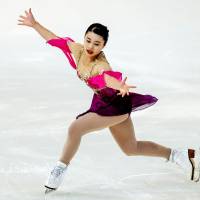ISU announcer Ted Barton has seen it all during his long career in the sport.
From his days as the Canadian junior champion, to skating against legends like John Curry and Robin Cousins in the 1976 world championships, to helping craft a new judging system following the Salt Lake City scandal, the New Zealand native has been front and center as skating has blossomed around the world.
Despite his broad experience and deep knowledge, he says that what he has seen with Japanese skating over the past 10 years is something he has witnessed nowhere else.
"They have developed a system in this country of development of youth," Barton said on the sidelines of the recent Yokohama Junior Grand Prix. "So with a 5-, 6- or 7-year-old the basics have been taught early enough to give a coach a lot to work with. If those basics are not established, you are constantly correcting them."
The 62-year-old Barton is a lot more than just an announcer. He is also the executive director for Skate Canada (British Columbia/Yukon), where he oversees programs involving some 20,000 skaters, so he knows what is required to mold a skater into a champion.
Barton credits the grass-roots efforts put in by Japanese coaches around the country as being the catalyst for later success.
"It's what those coaches are doing every single day at those rinks. They are taking not one kid, but 30 or 40 kids and bringing them to a high level at an early age," he said.
"This is something that our country (Canada) doesn't do that. We are in an older system of teaching — the 15-minute lesson. We have tons of rinks and teachers, but it's the old system.
"Here it is more systematic. It's like a curriculum taught by groups. It is very smart how they have approached it. And of course they have heroes."
Barton expressed admiration for Mie Hamada, the coach of world junior champion Marin Honda and young stars Yuna Shiraiwa and Rika Kihira, and how she works with her charges.
"She still loves teaching the little ones. I think she still wants to understand the maturity process of the kids," he commented. "If you are getting somebody at 10 or 11 or 13, and you don't know who they are as a person it is difficult. What she is doing is very smart. She is a very good coach. I watch her very carefully and how she handles her athletes. The environment she has is breeding success."
Barton was effusive in his praise of how Japan has helped transform the sport, not just in Asia, but around the world.
"The fan environment, the energy, the amount of money that has gone into the sport here. The heroes. Obviously they have created heroes," he noted. "Little kids are at home on TV watching it and they want to do it. There is a desire there."
Barton, who moved to Canada from Auckland when he was a young boy, believes that skating has provided a form of expression for younger generations to express themselves in a country that has been traditionally conservative.
"The sport has allowed the younger culture here to inspire because of television," Barton said. "Whether it is by fashion, music, makeup, style. That transition in this culture — it seems to be modernizing — lends itself to that. It is very interesting to watch. We are all jealous, by the way."
Barton's job with the ISU is one that is certain to make skating fans envious. He travels the world during the Junior Grand Prix season going to all the events and provides commentary on the federation's YouTube channel.
It is a wonderful opportunity to see talented young skaters compete and grow. The events are shown live, but can also be watched later in full and in segments of the individual skaters.
Skating enthusiasts can thank Barton that they have the chance to watch the JGP on YouTube, which is now in its third season.
Why?
Because the entire concept was his idea.
The telecasts of the JGP actually evolved from Barton's altruistic desire to give skaters living outside of metropolitan areas in Canada the opportunity to watch and learn from their peers.
"I started a lot of streaming for skating in Canada many years ago," Barton stated. "It wasn't for entertainment. It was so that coaches and skaters in rural areas way up north in our country would be able to see good skaters and emulate them.
"This was the original concept — so skaters who didn't live around a big city could watch skaters of their own age. An 8-year-old in Prince George, British Columbia, doesn't get to travel down to Vancouver or Toronto and see another 8-year-old, so this was a way they could see each other at that age and say, 'If they can do that, I can do that.' "
After his early ventures in streaming, Barton saw the potential for global growth and approached skating's governing body about the JGP series.
"The only property the ISU really owns is the Junior Grand Prix. Television owns everything else," Barton pointed out. "This is a way we can expand this around the world. I went to the ISU with a proposal and the council agreed."
So this season Barton is traveling to seven countries for the seven JGPs on the circuit in seven weeks. When asked how he kept up with the rigors required to do the job, Barton smiled and spoke from heart.
"It's passion," he said. "Just like the skaters, I love what I do. When you are involved in something new, you are driven by adrenaline and passion seeing it come to fruition, much like a skater, coach or choreographer."
Barton, who skated in shows with icons of the sport like 1968 Olympic champion Peggy Fleming back in the day, saluted Japanese fans for their passion and understanding of skating.
"My whole life is this sport. I have been in it for 40 years," he commented. "I have never seen an audience respond like they did yesterday. They were not sympathetic, they were always appreciative of the effort. They appreciate the passion and the effort to skate.
"They are very aware of what is excellent and what is good. They always give a great hand to everybody. The Japanese audience follows it in the media here, they follow it online. Now they have the technology to do it. They can follow the Junior Grand Prix."
Barton gave an example of just how profound the impact of Japanese fans is on the JGP telecasts.
"When a Japanese skater takes to the ice, whether we're in Russia or Slovenia, our numbers go through the roof," he revealed. "It could be 1 a.m. in Japan and the numbers of viewers goes way up, sometimes twice what it was before they came on. We could be at 4,000 or 5,000, and then it will shoot up to 8,000 or 9,000."
Barton says that along with the progression in skill level of skaters from Japan, they have also become more attuned to other important nuances in the sport.
"The Japanese athletes, even the juniors, are very camera aware," he observed. "They know how to recognize when they are being watched. It's brilliant."
Last week: Yuna Shiraiwa finished fourth at the JGP in Saransk, Russia, as the host country swept the medals in women's singles.
Shiraiwa was third heading into the free skate, but fell on her final jump (a triple loop) and missed the podium.
Kokoro Iwamoto placed fifth following a nice free skate.
Up next: Marin Honda and Rika Kihira will look to lock up spots in the JGP Final when they compete in Ljubljana, Slovenia, this weekend. Both took second in their first assignments.
Kazuki Tomono, who was fourth in Yokohama, will be Japan's lone representative in men's singles in Slovenia.
Contact Ice Time at: [email protected]




















With your current subscription plan you can comment on stories. However, before writing your first comment, please create a display name in the Profile section of your subscriber account page.